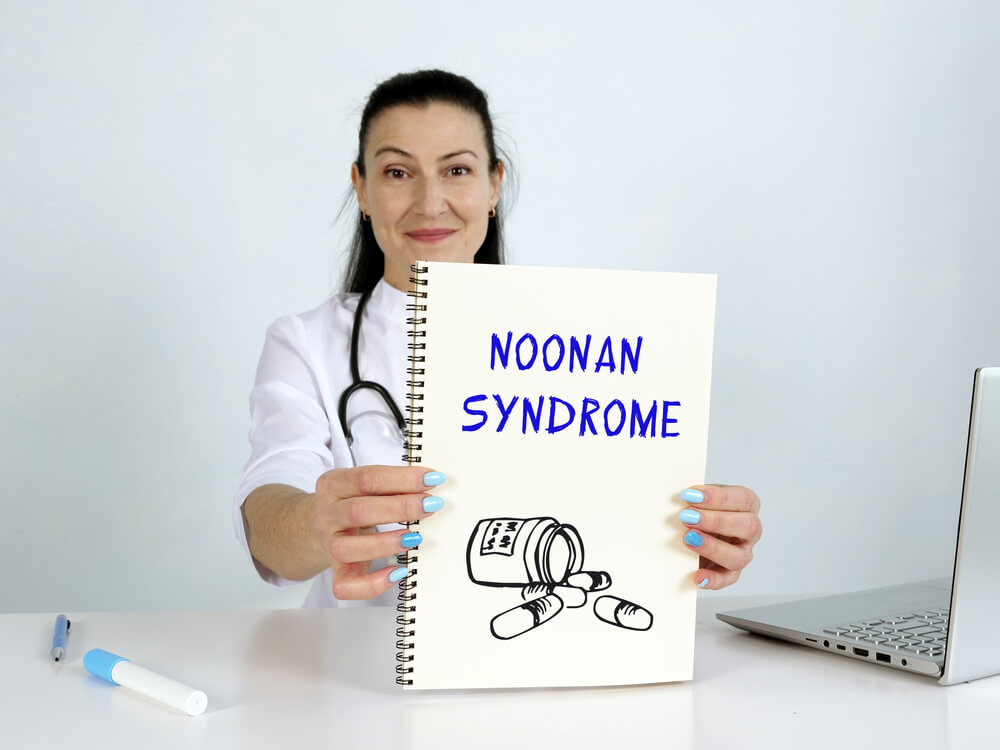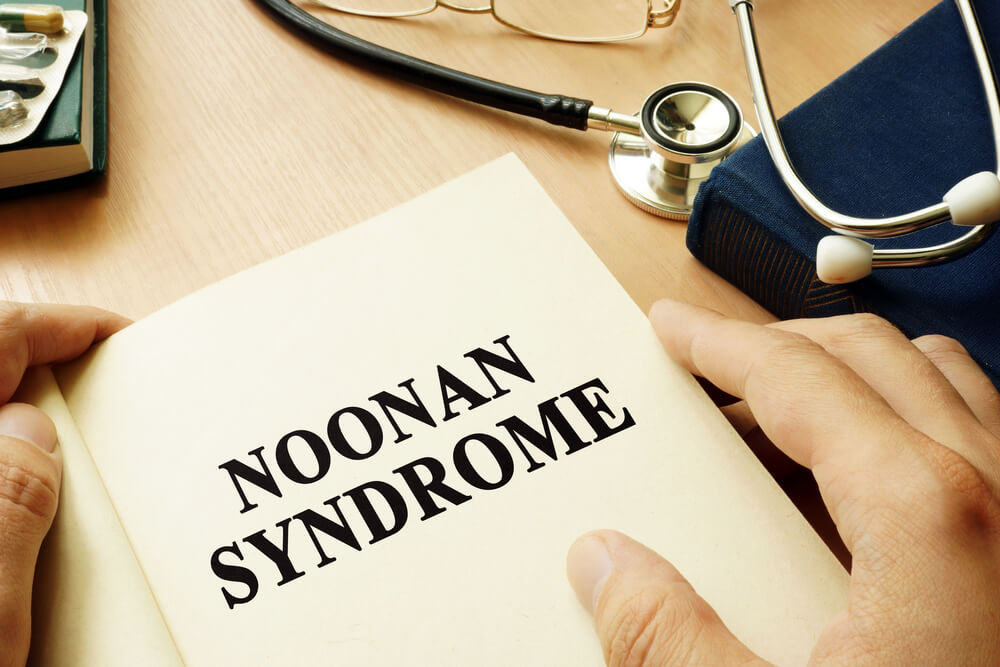Noonan Syndrome is a rare genetic disorder that may be life-threatening but is highly treatable with regular medical care from a genetic disorder doctor and a team of specialists.
What is Noonan Syndrome?
Noonan Syndrome is a disorder caused by a genetic mutation. It may be inherited; children with a parent who has the condition have a 50% chance of developing it themselves. It can also develop due to a new genetic mutation, even if the patient is not genetically predisposed.
Most commonly, Noonan Syndrome affects facial appearance, the lymphatic system, clotting, bone structure, fertility, and the heart. The involved genes are responsible for tissue formation throughout the body. Patients have a 3x higher mortality rate than the general population, but despite this, Noonan Syndrome life expectancy is average when treated, and most patients are able to live normal lives.
How Do I Know If My Child Has Noonan Syndrome?

Consult your pediatrician if you are concerned that your child may have Noonan Syndrome symptoms. A family history of Noonan Syndrome is a strong indicator that you should speak with a genetic disorder doctor, but keep in mind that a family history of Noonan Syndrome does not necessarily mean your child will have the condition. Similarly, your child can develop Noonan Syndrome even if you and your partner are not carriers.
Noonan Syndrome Symptoms
Many of the symptoms of Noonan Syndrome vary widely in severity from person to person, though the tell-tale facial appearance is a crucial symptom leading to clinical diagnosis.
Some of the most common Noonan Syndrome symptoms include unique physical characteristics. An individual with Noonan Syndrome will display unique facial features, such as a broad forehead, drooping eyelids and a wider-than-usual distance between the eyes or a short stature. At birth, a child with Noonan Syndrome is of regular length, but at two years of age, they grow noticeably slower than average, and the growth spurts you’d expect to see during puberty are minimal or don’t happen at all.
Heart defects are another significant concern with Noonan Syndrome, and most patients with Noonan Syndrome will have at least one form of congenital heart disease. Often these symptoms appear as unusually narrow heart valves (pulmonary stenosis), unusually large heart muscles (hypertrophic cardiomyopathy), or a hole in the heart (septal defect). These are almost always accompanied by an irregular heart rate.
Other Noonan Syndrome symptoms may include:
- Eye conditions
- Cross-eye or other problems with eye muscles
- Astigmatism, myopia, or hyperopia
- Rapid eye movement
- Cataracts
- Broad nose
- Low set ears
- Hearing problems
- Crooked teeth
- Highly arched palate
- Small jaw
- Short neck with excess skin folds
- Excessive bleeding or bruising
- Lymph issues, especially excess fluid in hands and feet
- Unusual structure in the chest
- Raised or sunken sternum
- Wide-set nipples
- Spinal deformities
- Thin or transparent skin
- Learning disabilities
- Typically average intelligence
- Mental, emotional, or behavioral issues
- In males: undescended testicles and issues with fertility
- Kidney problems (usually mild)
Congenital heart disease can be life-threatening. According to the NIH, long-term outcome depends largely on the presence and severity of congenital heart defects. Many Noonan Syndrome symptoms tend to lessen with age, so with the right treatment and management, patients can live relatively normal lives as adults. Noonan Syndrome life expectancy can be normal, as long as cardiac symptoms are controlled.
If you believe your child is displaying Noonan Syndrome symptoms, speak to your pediatrician. They will be able to refer you to a genetic disorder doctor and other specialists who can diagnose your child, help you understand what Noonan Syndrome is, and help you manage it.
Noonan Syndrome Tests and Diagnosis
While a genetic disorder doctor may feel confident about a Noonan Syndrome diagnosis based on the characteristic facial features, the key to diagnosis is genetic testing. Many of Noonan Syndrome’s symptoms can be caused by other conditions, and in some cases, the physical characteristics may be slight. Genetic tests are conducted on a sample of blood or saliva. The sample is analyzed in a lab, and the result will tell you if there is a mutation in the genes known to cause Noonan Syndrome.
The conditions and symptoms that make up our understanding of what is Noonan Syndrome can vary in severity. Because of this, after a genetic test confirms the diagnosis, your genetic disorder doctor may recommend other tests to assess the extent of your child’s symptoms. These may include:
- Eye tests
- Hearing tests
- Blood tests
- Echocardiogram
- Electrocardiogram
Noonan Syndrome can be inherited genetically, so you may want to test for it if you are pregnant. If you, your partner, or a close relative have Noonan Syndrome, there is a significant chance your child will have it, too. Another reason to test is if your routine ultrasounds show possible signs of Noonan Syndrome like pleural effusion or polyhydramnios. To test your unborn child for Noonan Syndrome, your doctor will collect a sample of your baby’s DNA from the placenta or amniotic fluid.
After a genetic test of your child or unborn baby confirms a Noonan Syndrome diagnosis, you should speak with a genetic disorder doctor and your pediatrician to understand your child’s Noonan Syndrome life expectancy, what to expect, and how to treat and manage the symptoms of their condition.
Treating Noonan Syndrome

There is currently no way to repair mutated genes responsible for conditions like Noonan Syndrome, so there is no cure. However, with early diagnosis and managed care, treatment is possible and very successful in helping patients live a normal life.
Noonan Syndrome is treated by treating the symptoms it causes, such as medications or surgeries for congenital heart disease or growth hormone therapy for stature and growth. Heart disease is the most critical element to Noonan Syndrome life expectancy. if the heart disease is not too severe or is well-managed, Noonan Syndrome life expectancy can be on par with the general population.
If your child is diagnosed with Noonan Syndrome, it is crucial to assemble a team for their care. This will begin with your pediatrician and genetic disorder doctor. From there, you may want to find a cardiologist to keep your child’s heart healthy, eye and/or ear doctors, as well as specialists who can help with learning disabilities or behavioral issues, genital or fertility problems, and dental and orthodontic care. If possible, try to seek specialists who are already familiar with the disorder, but be prepared to advocate for your child and explain Noonan Syndrome to each new practitioner you meet with.
A strong support system is also critical for individuals and families dealing with chronic disorders. This can include friends and family, a genetic counselor, psychologists and psychiatrists, and support groups.
Life with Noonan Syndrome
Noonan Syndrome is not a death sentence. While some symptoms may be life-threatening, overall, this genetic disorder is highly treatable and manageable. The best thing you can do for your child if you suspect, or they have recently been diagnosed with Noonan Syndrome is to bring them to a knowledgeable and trustworthy specialist in genetic diseases and pediatric endocrinology.
Tell us what you think. Has your child been diagnosed with Noonan Syndrome or another rare genetic disorder? Do these symptoms sound familiar? Comment below to let us know what you think. And if you are looking for an endocrinologist in Florida to care for your child with Noonan Syndrome, give us a call or request an appointment today.


